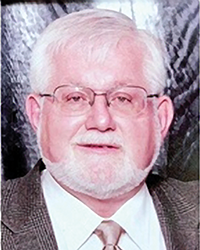Former NRCA vice president passes away
 Van Wagoner |
John Demarest Van Wagoner II, former NRCA vice president, passed away Aug. 25. He was 89.
Van Wagoner co-founded the Prospect group of commercial roofing and waterproofing companies in Crystal City, Va., in 1968. The Prospect group of companies completed work on several notable buildings, including the National Gallery of Art, National Geographic Society and John F. Kennedy Center for the Performing Arts. He also co-founded Insulated Building Systems, Winchester, Va., a manufacturer of expanded polystyrene insulation and related building products, and GeoTech Systems Corp., Great Falls, Va., a company that develops and tests geosynthetic materials. GeoTech Systems produced the first below-grade prefabricated drainage system for foundation and retaining walls in the U.S. In addition, Van Wagoner was issued six U.S. patents and one Canadian patent and published several technical papers related to his work.
Van Wagoner served as NRCA vice president from 1982-84 and NRCA director from 1980-82 and 1984-87. He served on numerous NRCA committees, including the Government Relations Committee, Manual Update Committee, Political Action Committee, Research Services Committee and Technical Operations Committee. Van Wagoner also was a member of the National Roofing Foundation, The Roofing Industry Educational Institute, Virginia Association of Roofing Professionals and Washington Area Roofing Contractors Association.
Van Wagoner is survived by three children, seven grandchildren and one great-grandchild. Donations in Van Wagoner's name may be made to St. John's Episcopal Church, Georgetown, by clicking here or the Washington National Cathedral by clicking here.
Small businesses receive retirement plan assistance
On Aug. 31, President Trump signed an Executive Order directing his administration to loosen restrictions on small businesses that want to band together to offer retirement savings plans to their employees.
The order is meant to remove some of the administrative burdens and costs small businesses currently face and directs the Department of Labor (DOL) and Department of the Treasury to study the issue and offer new rules.
DOL will look at expanding criteria for multiple employer plans (MEPs), which currently are limited to companies that share common characteristics, such as operating in the same industry; this requirement could be changed so more companies can participate.
The Department of the Treasury will review regulations such as those governing minimum distributions retirees must take from their 401(k)s and individual retirement accounts; those distributions may be lowered so savers can keep more money invested for a longer time.
"Small businesses will no longer be at a competitive disadvantage and small-business workers will be treated more fairly," President Trump said at a signing ceremony in Charlotte, N.C. Small businesses "will be able to pool their resources so they'll have the same purchasing power—or even more, frankly—as large businesses."
Officials say the departments' reviews could take months; public comments will be solicited before new regulations are approved.
The order was signed a day before DOL's regulation expanding access to a small-business health insurance option—association health plans (AHPs)—took effect; that regulation came in response to an Executive Order signed by President Trump in October 2017. Expanding access to MEPs for retirement is considered less controversial than the AHP rule, which currently faces a lawsuit by 12 state attorneys general alleging DOL violated federal rulemaking law when it released the rule.
Finance Committee Chairman Orrin G. Hatch (R-Utah) is a co-sponsor of the Retirement Enhancement and Savings Act (RESA), bipartisan legislation with a similar MEP provision. Hatch says he welcomes the Executive Order but passing RESA still is a priority.
Unions' weighted average pay hikes drop to 2.9 percent
On Aug. 30, Bloomberg Law reported unions negotiated a weighted average first-year wage hike of 2.9 percent, which is a decrease from 3.2 percent in mid-August. Weighted averages consider the number of workers covered under each contract.
Two contracts provided small first-year wage increases for a large number of workers and likely are the cause of the decrease—a three-year contract signed by the Screen Actors Guild-American Federation of Television and Radio Artists raising wages for about 160,000 workers by 2.5 percent in the contract's first year, and an agreement between New York City and the American Federation of State, County and Municipal Employees raising wages for about 100,000 workers by 2 percent in the contract's first year. Both contracts offer higher wage increases in the second year and beyond.
The average first-year union wage hike across all industries was unchanged at 3.1 percent through Aug. 26 compared with 2.6 percent in 2017. Bloomberg Law analyzed 411 union contracts for the report, which is based on biweekly calculations through its database of U.S. wage settlements.
Longtime NRCA member passes away
 Hoselton |
Raymond Lewis Hoselton, former owner-operator of Union Roofing Co., Chenoa, Ill., passed away Aug. 24. He was 75.
After college, Hoselton joined Union Roofing, a roofing contracting company his family founded in 1931 to serve local residents. Union Roofing joined NRCA in 1966. Hoselton also was active in his community as a member of Chenoa Jaycees, the Knights of Columbus and St. Joseph's Catholic Church.
Hoselton is survived by his children, Doug, Jeff, Rod, Stacie and Suzanne; 16 grandchildren; eight great-grandchildren; and many nieces and nephews. He was preceded in death by his wife, Sharon; parents, Clarence and Marcella; brothers, Stan and Ted; and sister, Marcella. Donations in Hoselton's name may be made to Mayo Clinic by clicking here, or St. Joseph's Catholic Church, 225 W. Owsley St., Chenoa, IL 61726.
Construction industry searching for opioid epidemic solutions
A recent study by the Massachusetts Department of Public Health found construction industry workers were five times more likely to die from opioid overdoses than other workers, according to Bloomberg Law. From 2011 through 2015, the construction industry fatality rate was about 125 deaths for every 100,000 full-time workers for a total of 1,155 deaths in Massachusetts.
Ken Serviss, executive director of the Allied Trades Assistance Program in Philadelphia, says cultural changes are crucial to combating the opioid crisis—including encouraging workers to talk about their opioid problems and employers accepting workers back after rehabilitation treatments.
The National Association for Home Builders in Washington, D.C., established an opioid working group in early 2018 and still is developing programs for its members, which mainly are small-sized contracting companies that do not have full-time safety staffs.
The Massachusetts study linked high opioid fatality rates among construction industry workers with the likelihood of workers being injured on the job, so preventing injuries is viewed as part of the solution. And some organizations, such as the Allied Trades Assistance Program, are going even further, requiring all apprentices to take a free eight-hour online course addressing substance abuse. It also helps guide members to treatment programs reviewed by the organization and encourages employers to allow workers to return to work post-treatment. Serviss says many sites employ zero-tolerance programs that dismiss workers who fail drug tests with no way to return; these types of programs also can unintentionally make workers afraid of seeking treatment on their own.
Serviss emphasizes the importance of training certain workers to recognize potential abuse problems and to be someone co-workers can turn to with addiction problems. He says 50 of these volunteer "peer advocates" have been trained so far, and he hopes the peer advocate program will expand in the U.S.
Los Angeles-based construction contractor AECOM discusses opioid hazards with its workers. Cece Weldon, vice president of corporate safety, health and environment management solutions for AECOM, says monitoring opioid prescriptions is a challenge because privacy laws prevent a company from knowing the treatment a worker receives for job-site injuries. However, if AECOM is concerned about an employee's opioid prescription, it can contact the worker and physician using "field case nurses" to discuss the hazards.
Weldon says the challenge for anyone trying to prevent opioid deaths or addiction is there is no single solution.
Register for Roofing Day in D.C. 2019!
Registration materials now are available for Roofing Day in D.C. 2019. The second annual event will be held April 3-4 at the Hyatt Regency Washington on Capitol Hill. The event brings the roofing industry together to meet with members of Congress and their staffs to deliver a unified message about the most important legislative and regulatory issues affecting industry businesses.
During Roofing Day in D.C. 2018, more than 400 roofing industry stakeholders from 47 states and Puerto Rico took part in the inaugural event. Participants advocated for a bill to improve career and technical education, and soon after, Congress approved the legislation and President Trump signed it into law.
Roofing Day in D.C. 2019 participants will build on the first event's success to further strengthen the roofing industry's influence on Capitol Hill. NRCA is seeking strong participation from all sectors of the industry to maximize the event's impact. Participants will receive training and information in preparation for visits to Capitol Hill.
Event information and registration materials are available by clicking here.



